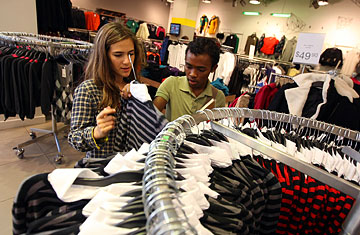
Shoppers browse racks at retailer H&M in San Francisco.
The next venerable institution to fall victim to the financial crisis could be Santa Claus. Retailers are bracing for a holiday shopping season that is shaping up to be the worst in recent memory, as debt-ridden consumers cut back spending amid rising fears that the U.S. is in a major recession.
The National Retail Federation (NRF), the world's largest retail trade association, projects that November and December sales will rise only 2.2% to $470 billion, an increase that would fall well below the 10-year average of 4.4% holiday sales growth and would mark the most sluggish season since 2002, when sales rose only 1.3%. Scott Krugman, NRF spokesman and vice president, says the dismal forecast should surprise no one. "It is surprising that we had a year's worth of bank consolidations on Wall Street in a week, but low consumer confidence isn't," Krugman says. "This was a slow downward progression throughout the year as far as retailers were concerned."
Other experts are even more pessimistic. Archstone Consulting, a retail consultancy based in Stamford, Conn., expects only a 0.5% to 1% sales increase for the holidays. "That's a very low number by historical standards," says Dave Sievers, Archstone's strategy and retail practice leader. "That would really translate into negative per capita growth, because we automatically expect some gains due to inflation and an expanding population, which usually average out to 4%."
Holiday shopping is crucial for retailers because it accounts for as much as 40% of their annual sales. But consumer confidence has plummeted as Americans get squeezed by a housing crisis, rising unemployment rates, high food and gas prices, and a stock-market meltdown. Nine in 10 consumers believe the economy is in a recession, according to the most recent report of the University of Michigan Survey of Consumers. The barrage of bad news surrounding the $700 billion congressional bailout appears to have had a significant effect on shoppers' outlooks. At the end of September, 79% of consumers said they were expecting bad economic times in the year ahead, up from 57% in early September. "It's hard to pick up the paper and not be transported back to 1932," says Sievers. "It's a volatile environment, but we think last week was as bad as it can get."
According to the University of Michigan survey, one-third of consumers cited fears over job security and income level as reasons for delaying purchases of household items including furniture and appliances. Jennifer Barrow, a writer for the TV show King of the Hill, says her extended family is considering limiting all Christmas gifts to $25 and may skip presents for adults. "While the financial crisis has not hit me personally, I am concerned," says the Burbank, Calif., single mother. "I am definitely trying to follow a budget for the first time and rein in spending."
Even typically profligate teenagers are turning thrifty. A recent nationwide survey of consumer attitudes conducted by WSL Strategic Retail, a New York consultancy, found that out of 750 teens interviewed, 84% say they have been affected by rising prices. Before they ask for something, 56% of teens say they now consider whether their parents will be able to afford it, with 42% stating that they are asking their parents for less. "If teens are exercising more restraint and curtailing what they ask for, that certainly doesn't bode well for holiday shopping," says Candace Corlett, president of WSL Strategic Retail.
Nor are usually resilient retail sectors like luxury goods expected to be unscathed. The collapse of major banks and Wall Street firms means thousands of wealthy consumers are faced with vanishing annual bonuses at best and job losses at worst. "Even in a down economy like last year, the luxury market tended to be recession-proof," says Krugman of the NRF. "But Wall Street workers were hit the hardest, and they make up the core customers of the luxury market, especially in New York City."
To adapt to leaner times, retailers are keeping fewer items in stock and many department stores are hiring fewer extra workers for the holidays. Shops selling necessities may weather the Christmas storm best. "The stores that will do well are the ones selling what you have to have to survive and selling it cheaply," says Howard Davidowitz, chairman of Davidowitz & Associates, a national retail consulting and investment-banking firm. Says Barrow, the Burbank TV writer: "Every financial decision I make, I now ask myself, Do I really need this?"
